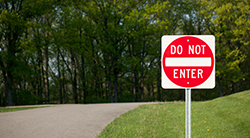 The Land of Israel is not the Jewish people's birthplace.
The Land of Israel is not the Jewish people's birthplace.
"The land of Israel was the birthplace of the Jewish people. Here their spiritual, religious and political identity was forged." (Declaration of the Establishment of the State of Israel)
The opening statement of Israel’s Declaration of Independence stands in direct contradiction to the age-old Jewish ethos, according to which the wilderness was the birthplace of the Jewish people, and the Diaspora was where their spiritual, religious, and political identity was shaped.
The difference here is not a minor one: there is a gaping cultural chasm between the people of "the wilderness" and the people of "the Land” (of Israel).
The wilderness has an important role in shaping Jewish heritage and the Jewish sense of independence.
Four out of five of the five books of the Torah take place in the wilderness. The Torah is given in the wilderness and finishes the night before the people’s entry into the Land of Israel. The Hebrew name of the fourth book of the Torah, the book we read this at this time in the Jewish year, is called B’midbar, "In the Wilderness" (the Book of Numbers).
Reckless, like the wilderness
One of the cryptic descriptions of the wanderings of the people of Israel in the wilderness appears in our weekly portion, Chukat:
"And from Midbar [the wilderness] to Mattanah, and from Mattanah to Nahaliel..." (Num. 21:18-19)
The Sages of the Talmud choose to see in this description of the wilderness a parable for the inner world of those who study Torah:
" 'From Midbar (wilderness to) Mattanah, and from Mattanah (to) Nahliel, and from Nahliel (to) Bamot.' When a person makes himself reckless and available to all like a wilderness, Torah is given to him for a gift (mattanah)." (Babylonian Talmud, N’darim 55a)
This midrash offers paradoxical thinking — the ethics of opposites. A person needs to give everything up, abandon and disown one’s self and needs, in order to merit receiving the greatest gift of all — Torah.
Recklessness versus conservatism
The Hebrew word, hefker, “reckless abandonment,” describes the a person who abandons a sense of identity and self, as well as attachment to or ownership of land, and instead becomes open to experience the wilderness. Then one becomes a person who exposes one’s self to a new body of knowledge and becomes "an agent of the Divine will." The suggestion to find freedom in recklessness and abandonment opens new horizons.
Recklessness versus modesty
Modesty stands in opposition to recklessness. Total openness to new learning stands in opposition to closed-mindedness and concealing one’s self from the world. According to the image of the wilderness that we have seen, the ideal student is a student not owned by preconceived notions. One renounces commonly accepted defenses and turns to a new type of observing.
And what is modesty?
While difficult to digest, a fascinating tradition proposes a subversive perspective on the idea of modesty. In the Babylonian Talmud, a lesson is given on the intimate relationship by Rav Chisdah to his two daughters:
"Rav Chisdah says to his daughters: 'Be modest in front of your husbands; Do not eat bread in front of your husbands, do not eat vegetables at night, do not eat dates at night, do not drink alcohol at night, don't go to the toilet where your husbands go to the toilet... He [Rav Chisdah] held a pimpernel [marganit] in one hand and a kura [a term of uncertain meaning] in the other hand. 'Show [your husbands] the marganit and do not show [your husbands] the kura until they are sorry, and then show them.'" (Babylonian Talumd, Shabbat 140b)
According to Rav Chisdah's approach, female modesty is the key to successful relationships. His list of modest behaviors is specific, but not completely clear. It seems the modesty that Rav Chisdah is talking about is the modesty of female bodily excretions. Closeness and intimacy are fine and dandy, says Rav Chisdah, but there is a limit.
He recommends to his daughters to be punctilious in hiding their bodily excretions from their husbands: not to eat in front of them and not to go to the bathroom where their husbands can see then.
This is how Rashi explains Rav Chisdah's advice: Why does it say not to eat bread in front of their husbands? "Twice eat excessively and you will be degraded by him." And why not eat vegetables at night? "Because it causes bad breath." And what is wrong with eating dates or drinking alcohol at night? "It causes diarrhea and leads to belittlement."
Women are actually the wilderness.
Indeed, the body of the woman receives the man inside it, and from the female body the next generation is born. One can say that the essence of the woman is "breached and open like wilderness." (The Hebrew word for “breached” has the same root as the Hebrew word for “prostitute.”)
Rav Chisdah presents a limited and frightened point of view that distinguishes between a man and a woman. He requests that his daughters cover the "breaches" and "openings" of their bodies and encourages his daughters to convey to their husbands the idea that: "We are sealed and closed, wrapped like gifts. We are modest. We do not eat or excrete."
What is a marganit and what is a kura?
Rav Chisdah's final instruction is the most cryptic of them all, and Rashi chooses to explain it with explicit sexual content:
"When your husband is having sex with you and attempting to arouse your desire and is holding your breasts in one hand and the other at 'that place,’ offer him your breasts to increase his desire, and don't let him find your actual 'sexual site' too quickly, so that his desire increases until he wants you so bad it hurts, and then show him." (Rashi on Babylonian Talmud, Shabbat 140b).
So kura is the female sex organ and the marganit is a breast. And Rav Chisdah, according to this interpretation, offers his daughters explicit instructions for "foreplay."
Modesty is seductive.
We must not mistake Rav Chisdah's words: when he suggests to his daughters that they be modest, he is teaching them how to be seductive. It is commonly acceptable to see the education of women for modesty as a cover and also a defense against sexual temptation. But Rav Chisdah explains that the opposite is true. Modesty, while it does close women off from the world, simultaneously creates curiosity and arousal for them. Modesty is a means of tempting men and not restraining them.
Back to the recklessness of the wilderness...
The depiction of the desert really does encourage learners to dare to open themselves to new experiences. The Sages, scheming for themselves boldness and innovation, ask to teach us that a reckless man will conquer new destinations, but a reckless woman?
Women are educated to be terrified of the adjective "reckless," as they must be modest. Certainly not tempting, not innovative, and not deviant. A creative reckless man is supposed to return after the conquest to his home. There waits his conquered wife who has conquered her will in order to allow his to flourish.
We will not have fully received the Torah unless all can become “reckless” like the wilderness.
(I am grateful to the students in the rabbinical program at Hebrew Union College-Jewish Institute of Religion in Jerusalem. In their wise and pleasant company I studied the words of Rav Chisdah and his daughters.This article was translated with the help of Uzi Bar Pinchas.
Dr. Ruhama Weiss, Ph.D., is the director of the Blaustein Center for Pastoral Counseling at HUC-JIR in Jerusalem.
 Miriam dies and the wellspring of water (Torah?) dries up. This can be read as simply a sequence of events: Miriam died and also there was no more water. But the Talmud does not see it that way:
Miriam dies and the wellspring of water (Torah?) dries up. This can be read as simply a sequence of events: Miriam died and also there was no more water. But the Talmud does not see it that way:
"The well was given to the Jewish people in the merit of Miriam... When Miriam died the well disappeared, as it is stated: 'Miriam died there' (Num. 20:1), and it says thereafter in the next verse: 'And there was no water for the congregation' (Num. 20:2)." (Babylonian Talmud, Taanit 9a)
God instructed that Moses and Aaron, “Order [speak to] the rock” (Num.20:8) But Moses strikes the rock to release the waters and God’s punitive response — Moses’ not entering the Land — is seen as extreme, as evidenced by the persistent Rabbinic searching for the “real” reason for this punishment. Ramban in his commentary on Num. 20:8, says the actual sin was hubris: “Can we draw water for you from this rock?" implying that they, Moses and Aaron, had the power to perform the miracle. Rambam blames it on Moses’ anger and name-calling (Sh’monah P’rakim, chapter 4). Abarbanel attributes the punishment to past sins: Moses’ sin of the spies and Aaron’s participation in the Golden Calf. Rashi ascribes the sin to a lesson lost: If water yielded from a rock through mere words, “I would have been sanctified before the whole congregation” (Rashi on Num. 20:12). The language of affirming God’s holiness is striking: it hearkens back the language of Sinai. There God spoke, saying:
“Go to the people and warn them to stay pure today and tomorrow. Let them wash their clothes. Let them be ready for the third day; for on the third day the Eternal will come down, in the sight of all the people, on Mount Sinai. (Ex. 19:10-11)
Moses came down the mountain to the people with God’s message, but added words of his own:
"And he said to the people, '[the men among] you should not go near a woman.' "Ex. 19:15)
One can easily imagine that the men who inhabited the midbar, “the open desert,” as Dr. Weiss writes, were “reckless and open” to Torah while the women were sequestered, closed off. God’s words to Moses at Sinai to sanctify the people are reflected in God’s admonition of Moses after he hit the rock:
"But the Eternal said to Moses and Aaron, 'Because you did not trust Me enough to affirm My sanctity in the sight of the Israelite people, therefore you shall not lead this congregation into the land that I have given them.' ” (Num. 20:12)
I wonder if, in the tradition of God using the rock-hitting as an opportunity to address an earlier sin, this was a punishment for Moses’ admonition to “not go near a woman” in preparation for Matan Torah, thereby excluding women. Perhaps the death of Miriam and the disappearance of the well brought back into frame the Sinaitic drying of Torah’s wellspring for half the people.
Rabbi Susan Silverman is an author, speaker, and activist residing in Jerusalem. She is co-author of Jewish Family and Life: Traditions, Holidays, and Values for Today’s Parents and Children, which launched a Jewish multimedia enterprise, JewishFamily.com, and author of Casting Lots: Creating a Family in a Beautiful, Broken World.
Chukat, Numbers 19:1−22:1
The Torah: A Modern Commentary, pp. 1,145−1,164; Revised Edition, pp. 1,022−1,042
The Torah: A Women’s Commentary, pp. 915–936
Haftarah, Judges 11:1-33
The Torah: A Modern Commentary, pp. 1,268-1,271 Revised Edition, pp. 1,043-1,046
